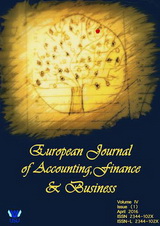|

ISSN: 2344 - 102X
ISSN-L: 2344 - 102X
Our journal is currently indexed in the following databases:
|
| |
Article from Volume 4, Number 1, Year 2016| THE IMPLICIT MISSION STATEMENT REGARDING FOSTERING THE INTEGRATION IN THE LABOR MARKET THROUGH ICT IN THE ECONOMIC EDUCATION INTRODUCTION | 
Download | | Author(s): Doina Prodan Palade, Marius Costel Esi | | DOI: 10.4316/EJAFB.2016.414 | | Abstract: The modern world, marked by the phenomenon of globalization and the continuous change, represents a real challenge for the educational system. As the human resources are the most important creational force of value in the work process, a specific attention must be given to the mission statemenet the formal instruction process, by which the individual acquires the abilities and competencies demanded by the labor market. The success of each individual within the society is determined by his capacity to correctly and quickly understand the surrounding reality. | | Keywords: Mission Statement, Business Organization, Human Resources, Economic Educational System, Information And Communication Technology (ICT), Implicit Mission. | References:
1. Andreica, H. T., & Dogar, C. (2012). XBRL - Extensible Business Reporting Language: Universal Language Of Electronic Business For Financial Reporting, Information And Analysis. Calitatea, 13(3), 697-704.
2. Belciug, A. V., Coloiu, Cretu, D., & Lupu, A. (2010). Utilizarea Tehnologiilor De Inteligen?? Artificial? în Dezvoltarea Auditului Continuu. Audit Financiar, 8(11), 46-54.
3. Chersan, I., Carp, M., & Mironiuc, M. (2013). Data Mining - O Provocare Pentru Auditorii Financiari/Data Mining - A Challenge For Financial Auditors. Audit Financiar, 11(10), 5764.
4. Ciocoiu, C. N., & ?erban, E. M. (2012). Harta Cuno?tin?elor Ca Instrument Pentru Transferul De Cunoa?tere: Impactul Dezvoltarii TI&C. Calitatea, 13(129), 48-54.
5. Constantin, L.V. & Dinica, L. (2006). Eficien?a Utiliz?rii TIC în Procesul Instructiveducativ. Conferin?a Na?ional? De Înv???mânt Virtual, Edi?ia A IV-a, 297-304.
6. Ionescu, B. S., Prichici, C., & Tudoran, L. (2014). Cloud Accounting - O Tehnologie Ce Poate Modifica Profesia Contabil? în România/Cloud Accounting - A Technology That May Change The Accounting Profession In Romania. Audit Financiar, 12(2), 3-15.
7. Muntean, V. D. (2012). Customizing Financial Accounting Information Of The Internet Environment. Calitatea, 13(3), 94-100.
8. N?stase, A. R., & Popa, D. R. (2011). Managementul Riscului: Solu?ia Pentru Succesul Afacerii. Electrotehnica, Electronica, Automatica, 59(1), 62-73, 6.
9. Oprea., D. (1999). Analiza ?i Proiectarea Sistemelor Inform?ionale Economice. Editura Polirom, Ia?i.
10. Ro?ca, I.G. & P?unescu, C. (2009). Analiza Diagnostic “Universit??ile ?i Dezvoltarea Capitalului Uman”. Proiecte Strategice Pentru Înv???mântul Superior.
11. Sprandel, H. (2009). Cooperative Education And Employment Outcomes For Postgraduation Business Students (Order No. 3395617). Available From ProQuest Central; ProQuest Dissertations & Theses Global. (304848368).
12. Stanciu, A., Mihai, F., & Aleca, O. (2009). Tendin?e ?i Evolu?ii în Dezvoltarea Aplica?iilor Dedicate Business Intelligence. Audit Financiar, 7(6), 15-22.
13. Stanciu, V. (2014). Cercet?ri Privind Provoc?rile Tehnologiei Informatice în Auditul Intern/Insights Of Information Techology Challenges In Internal Audit. Audit Financiar, 12(6), 31-37.
14. Van Heck, E. (2013). The Five Information Technology Blind Spots Of Economists. Revista De Administraçăo De Empresas, 53(3), 316-322.
15. Vlada, M. (2005). Tehnologiile Societ??ii Informa?ionale. Conferin?a Na?ional? De Înv???mânt Virtual, Edi?ia A III-a, 19-32.
16. Website: Https://www.pac-online.com/ (accesed 02.03.2016)
|
| | Back to journal ... |
|
|
| |
|
|
|

